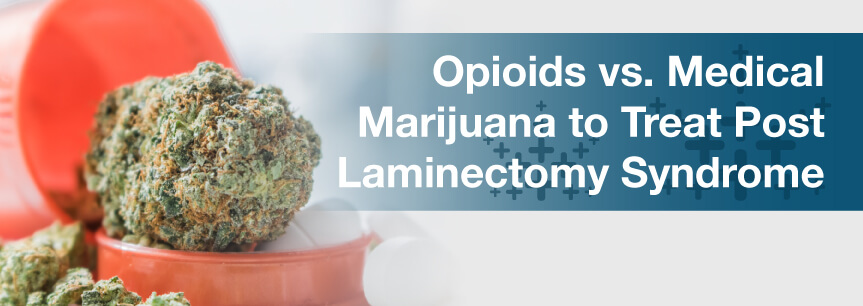
A patient can develop post laminectomy syndrome (PLS) or other complications after undergoing a spinal surgery known as a laminectomy. PLS makes it hard to handle simple, everyday tasks because of chronic and severe pain. When this occurs, improving quality of life becomes a priority.
There are many pain medications doctors can recommend to help patients manage their pain level, ranging from simple over-the-counter options to heavy-duty medication. They may even prescribe prescription opioids.
Although opioids can help mitigate pain, a variety of adverse side effects may make you want to think twice before medicating with these. Unhealthy dependency, a risk of addiction and more make the dangers of opioids outweigh their benefits. Medical marijuana, on the other hand, has relatively few side effects, is safe for users and is non-addictive.
Surprisingly, opioids are prescribed more commonly than medical marijuana, even though they have more potential risks. These medications are either derived directly from the opium flower or are synthetic versions of these drugs. These medications work in the pleasure center of the brain, which is what makes them highly addictive.
Opioids have many possible adverse side effects that can impair a patient’s ability to function normally. These include:
However, the most dangerous risk patients take by using prescription opioids is addiction. Users can easily become dependent on these drugs, forming a habit that then turns into addictive behavior. Thousands of people lose their lives every year due to prescription opioids abuse.
Cannabis is gaining acceptance in states across the U.S. as a healthier alternative analgesic, especially when compared to prescription opioids. Medical marijuana works with our body in a different way to combat pain. It binds to endocannabinoid receptors in the portion of the brain that regulates pain, allowing cannabis compounds to block pain signals.
Since marijuana doesn’t work in the pleasure center of the brain, the risk of getting addicted is extremely low — plus, there is not one reported case of death due to a cannabis overdose. Medical weed has very few adverse side effects, even after long-term use. If a parent experiences an unwanted side effect due to marijuana use, like paranoia, they wear off as the cannabis leaves their system.
In fact, the benefits of medical marijuana far outweigh the risks. The main type of pain experienced by patients with PLS is nerve pain. Many medications are unable to treat this kind of pain, making doctors turn to dangerous opioids. However, with cannabis on the scene as a medical alternative, physicians have a safer option they can choose.
Medical marijuana can also help PLS patients with other complications that arise due to their chronic pain, such as:
If you’re ready to take the next step and seek medical marijuana treatments, we can help. Although we’re proud to be a resource for those researching how medical marijuana can treat debilitating conditions like PLS, we believe you still need professional advice.
Our extensive database of doctors and medical marijuana dispensaries in your state will help you find experienced healthcare workers and budtenders who can offer you specific guidance based on your individual circumstances. They can also help you join your state’s medical marijuana program. Start your search today!